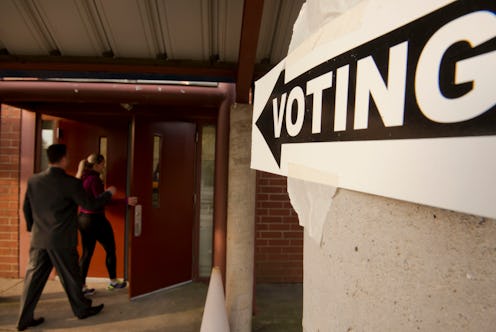News
North Carolina Allows Anyone To Challenge Voters
Currently, North Carolina allows any private citizen to challenge a voter's registration without their knowledge and using only a piece of returned mail. While North Carolina's process for challenging voter registration seems totally crazy, does it represent voter suppression? One civil rights organization thinks so. The NAACP has claimed that in canceling thousands of voter registrations in the run-up to Election Day, North Carolina election officials in at least three counties carried out a systematic purge of voters and violated the National Voter Registration Act.
"Voter fraud is nonexistent," NAACP President Rev. William Barber said Oct. 28. "It is in fact, voter suppression that is the real threat in this election."
North Carolina's state Board of Elections has reported roughly 4,500 challenges in recent months, including 3,951 in Cumberland County, 400 in Moore County, and 138 in Beaufort County. In a lawsuit filed Oct. 31, the NAACP alleged these challenges are a violation of the National Voter Registration and disproportionately targeted the state's black voters. That same day, the Department of Justice filed a statement of interest favoring the NAACP.
Under the National Voter Registration Act (NVRA), no jurisdiction can systematically purge voters within 90 days of an election or remove a voter's registration unless provided written notice of an address change or the voter in question fails to vote in two federal elections and does not respond to notice for two election cycles.
However, North Carolina state law is much more relaxed and allows for private citizens to challenge voters' registration up to 25 days before an election. Furthermore, the North Carolina Board of Elections has claimed the removals are not a violation of the NVRA as voters were notified of the challenge against them and challenges were brought individually not systematically.
While difficult to prove, the NAACP claims the North Carolina Board of Elections' recent purge was a Republican-led effort to suppress the vote of black residents. Although it's unclear how many challenged voters are African-American in Moore and Cumberland counties, the Huffington Post reported more than 65 percent of those purged from the list of registered voters in Beaufort County were black. Furthermore, Republicans did appear to be behind a majority of the challenges in two counties.
In the case of Moore County, N. Carol Wheeldon, the secretary of the county's Republican Party challenged roughly 400 voters' registrations using letters returned as "undeliverable" from an organized mass mailing. The letters had been marked "do not forward" prior to mailing. According to Mother Jones, none of the challenged voters attended either of the two hearings held and were not notified of the cancellation of their voter registration.
In Beaufort County, two Republican candidates who'd run for local office in 2015 challenged the registration of 138 voters in the last two months using letters returned as "undeliverable" during a mass mailing organized by Radcliffe's campaign.
With Election Day less than a week away, an emergency hearing was held Nov. 2, during which U.S. District Judge Loretta Biggs called the challenge process "insane" but did not announce a ruling. According to CBS, Biggs said the process sounded "like something that was put together in 1901" and noted she was especially "horrified" with the high number of voters removed from registration in Cumberland County. "It almost looks like a cattle call, the way people are being purged," Biggs reportedly told Cumberland County attorney Rick Moorefield. It is unclear when a ruling will be handed down.
The NAACP isn't alone in questioning the voter challenger process. According to a 2015 report from the Brennan Center, voter challenger laws are susceptible to abuse and were "historically enacted and used to suppress newly enfranchised groups, like African Americans and women."
North Carolina isn't the only state to allow private citizens to challenge a voter's eligibility. Similar processes are allowed in an additional 45 states. In 24 states, private citizens are able to challenge a voter's eligibility at the polls on Election Day without providing documented evidence to support their claim, often serving to intimidate or, at the very least, delay voters from casting ballots on Election Day.
